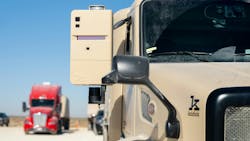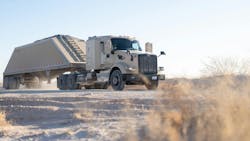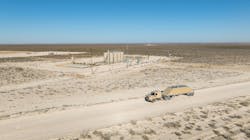Kodiak goes commercial: Delivers first RoboTrucks to Atlas Energy’s private fleet
After successfully moving 100 loads of frac sand in driverless Kodiak Robotics trucks on West Texas desert roads, Atlas Energy Solutions now owns two Kodiak RoboTrucks, marking an autonomous trucking milestone. The energy company plans to add more RoboTrucks in 2025 as it scales up autonomous operations in the Permian Basin. Kodiak leaders said this month this opens a new era for autonomous trucking that will lead to on-highway RoboTrucks.
Atlas is the first company to add two Kodiak Robotics-powered RoboTrucks to its commercial fleet. The Class 8 tractor-trailers have operated without drivers on private roads spanning the Permian Basin in Texas and New Mexico since late last year, the two companies announced January 24.
The autonomous truck developer’s leaders said the high-tech equipment delivery makes Kodiak the first autonomous trucking company to launch heavy-duty commercial driverless operations. They said this is the first stage in its commercialization roadmap, which includes future over-the-road long-haul operations.
Kodiak founder and CEO Don Burnette called the RoboTruck procurement and operational launch by Atlas “an incredible moment for us and for the autonomous trucking industry.”
Atlas uses its two Class 8 tractor-trailer RoboTrucks to deliver frac sand along a 42-mile private road looping through West Texas and eastern New Mexico.
How Kodiak RoboTrucks operate in Permian Basin
The energy company took over driverless operations on December 18—months after initially using Kodiak-owned trucks within operations last year along the same routes. Before the official RoboTruck delivery last December, Kodiak-owned autonomous trucks successfully hauled 100 proppant fracking material loads through the Permian Basin, one of the oldest and most productive natural gas and oil fields in the U.S.
About the Kodiak Driver system and Atlas’ Dune Express
Atlas Energy Solutions uses Kodiak Driver-equipped RoboTrucks that feature Kodiak’s sixth-generation platform.
This includes all the redundant components required for operations without a safety driver, such as Kodiak’s SensorPods. These pre-calibrated modular units house all the sensors for autonomous driving, enabling fast and easy repairs.
Atlas Energy Solutions launched the Dune Express, a 42-mile looping road to serve as an “autonomous conveyor system” that delivers sand to Atlas’s autonomous RoboTrucks and is a critical part of Atlas’s strategy to automate its entire supply chain.
“The commercialization of autonomous trucks has been a goal for the industry for many years, and it has now come to fruition,” Kodiak CEO and founder Don Burnette said. “Kodiak is the first company to make autonomous trucking a real business, and this is a major step towards profitability for our company.”
Atlas now owns its first two RoboTrucks—as Kodiak branded its Class 8 technology—and operates the self-driving semis within its private fleet that moves materials across the 75,000 sq. mi. Permian Basin.
The harsh West Texas environment is a great testing ground for autonomous technology, Daniel Goff, Kodiak director of external affairs, told FleetOwner during an interview in Las Vegas earlier in January. Along with these private dirt road operations in the Texas desert, Kodiak is developing autonomous defense technology for the military and over-the-road trucking.
See also: Fleets Explained: Autonomous vehicles
“I think the biggest driver of this as we start to scale up in West Texas over the course of 2025 is—and forgive the pun, but it’s unavoidable—it’s a literal sandbox for us to test technology under incredibly harsh environments,” Goff said. “These are dirt roads where things are constantly bumping up and down. Constant dust and junk are getting in the sensors. And we’re working out all those operational kinks so that when we go on-road, we will really know how to run a driverless fleet in a unique way.”
Atlas plans to increase its Permian Basin AV operations this year with more RoboTrucks.
“Incorporating these driverless RoboTrucks into our operations is a significant advancement in the automation of our business, enhancing our ability to maintain a fundamentally safe and reliable service at the best price for our customers,” Atlas CEO John Turner said.
To assist the private fleet’s robotic growth, Kodiak set up an office in Odessa, Texas, to support Atlas. The dozen Kodiak workers stationed in the 18,000-sq.-ft. facility is expected to grow to 20 workers by April.
“Becoming the first company to operate our own autonomous semi-trucks and reaching 100 successful autonomous proppant deliveries demonstrates our unique commitment to driving innovation and automation across the Permian Basin’s rugged terrain, dust, and heat,” Turner added.
Before launching driverless operations with Atlas, Kodiak developed a comprehensive safety case demonstrating its self-driving system’s readiness within Atlas’s operating domain. Its next step is to extend its safety case to highways for long-haul fleets.
About the Author
Josh Fisher
Editor-in-Chief
Editor-in-Chief Josh Fisher has been with FleetOwner since 2017. He covers everything from modern fleet management to operational efficiency, artificial intelligence, autonomous trucking, alternative fuels and powertrains, regulations, and emerging transportation technology. Based in Maryland, he writes the Lane Shift Ahead column about the changing North American transportation landscape.



